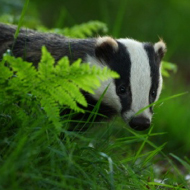
Survivors of culls may increase risk of TB spread
A study* led by researchers at the Zoological Society of London (ZSL) and Imperial College, London, has suggested that culling drives badgers to roam 61 per cent further afield – helping to explain why the practice, intended to reduce bovine TB transmission, can sometimes exacerbate the problem instead.
Published in the Journal of Applied Ecology, the paper reveals that, after a population was culled, surviving badgers covered more land each month than they had before the cull began, leading researchers to conclude that badgers explore new areas as individuals are removed from neighbouring groups and territories open up.
Badgers were also found to visit 45 per cent more fields each month, and the odds of a badger visiting neighbouring territories each night increased 20-fold – potentially increasing the risk of TB transmission both to cattle and to other badgers. These changes were witnessed as soon as culling began, meaning even badgers that were killed may have first spread the infection over wider areas while management was being implemented.
The effects of increases in ranging behaviour could create a source of infection for several months – long after the individual badger has been culled. In contrast, studies have shown that vaccination prompts no changes in badgers’ ranging behaviour.
Badgers, however, spent less time outside of their setts in culled areas – spending on average 91 minutes less per night out and about. ZSL scientists believe this could be linked to reduced competition and increased food availability as badgers are removed from the population.
Lead author and ZSL-Imperial PhD researcher, Cally Ham, explained: “Badgers spend a large proportion of the night foraging for food above-ground, and as culling reduces the size of the population, competition for food will also be reduced. We believe this accounts for the reduced activity levels, as well as bold individuals becoming obvious targets for culling and being quickly removed from the population.
“Because culling partly relies on shooting badgers moving around at night, the fact that badgers were active for fewer hours per night could actually be undermining culling efforts to further control badger numbers.”
* The research group from ZSL’s Institute of Zoology, and Imperial’s MRC Centre for Global Infectious Disease Analysis, studied 67 badgers across 20 cattle farms in areas with and without farmer-led culling in Cornwall, collecting GPS-collar data between 2013 and 2017.



 RCVS Knowledge has welcomed Professor Peter Cockcroft as editor-in-chief for Veterinary Evidence.
RCVS Knowledge has welcomed Professor Peter Cockcroft as editor-in-chief for Veterinary Evidence.